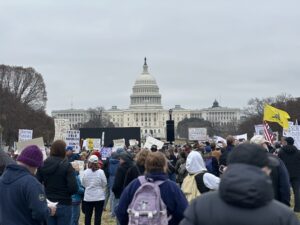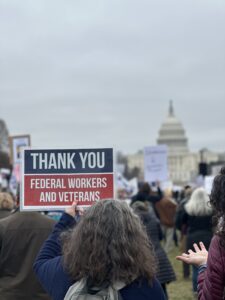One Plan Calls for an 80,000-Employee Reduction

Protestors, many of whom were veterans, gathered on the National Mall in Washington, DC, March 14, as part of a nationwide Veterans March to speak out against the Trump administration’s cuts to the federal workforce, particularly Veterans Affairs. Photo by Stephen Spotswood
WASHINGTON, DC — The Trump administration’s plan to cut approximately 80,000 employees from VA is receiving pushback from both Republicans and Democrats in Congress.
In addition, a judge has ordered the reinstatement of thousands of probationary federal employees who were summarily fired in February, including 2,400 from VA. It remained unclear whether the ruling will result in those employees being rehired, as the administration has delayed responding to similar rulings in recent days.
In the meantime, lawmakers are crafting legislation that they hope will put a stop to or at least mitigate what they categorize as the haphazard slashing of government programs. Last month, Sen. Richard Blumenthal (D-CT), ranking Democrat on the Senate VA Committee, introduced the Putting Veterans First Act, the most ambitious of the proposed bills. It would require VA to rehire all employees terminated during this wave of mass firings and provide them with back pay and benefits. It also would prevent VA from instituting a hiring freeze and bar the department from closing or realigning offices or programs that were approved by Congress without prior congressional notification. In addition, it would require the department to report quarterly on any costs associated with changes prompted by the Department of Government Efficiency (DOGE), which is overseen by Elon Musk.
“The real-life impacts of Trump and Musk’s harmful policies on our nation’s military and veteran community are undeniable and growing,” Blumenthal said. “These reckless actions are damaging the economic security and morale of our military and veterans’ families, the federal government’s ability to recruit and retain high-quality talent and our national security.”
Blumenthal’s Republican counterpart on the VA Committee, Sen. Jerry Moran (R-KS), said that he plans to introduce legislation of his own—one with more conservative goals than Blumenthal’s.
“Changes that affect VA personnel must be thoughtful, transparent and carried out in close coordination with this committee, with our colleagues and stakeholders, including veterans and the VSOs that represent them,” Moran said at a legislative hearing last month. “Congress must play a significant role in significantly shaping VA workforce decisions to achieve the right outcomes for veterans and their families.”
Collins to Testify

Veterans March to speak out against the Trump administration’s cuts to the federal workforce, particularly Veterans Affairs. Photo by Stephen Spotswood
According to Moran, VA Secretary Douglas Collins has promised to testify before the committee about the staffing cuts and how exactly they will result in improved delivery of healthcare and benefits.
The VA staffing issue cast a large shadow over congressional business, with Democrats in both the Senate and House commenting on how it was difficult to debate legislation with the specter of an 80,000-person staffing cut hanging above the agency.
“There’s some good pieces of legislation on the table,” Blumenthal said during a hearing, “but business as usual won’t get it at this moment in our history. The VA is in crisis. It is literally a five-alarm fire for the VA. This legislation may be well-intentioned and may have good effects, but it constitutes rearranging the chairs on the deck of the Titanic.”
In a similar hearing of the House VA Committee, Rep. Julia Brownley (D-CA) said, “I find it a bit crazy that we’re having a legislative hearing today rather than an oversight hearing on the Trump administration’s executive orders. The mass firing of VA employees, reckless contract terminations and $1 spending limit on purchase cards are causing significant upheaval within the [VHA], and we are here today proceeding to consider new legislation as if these changes aren’t already significantly impacting veterans’ access to care.”
Most clinical staff have been exempted from the cuts, which Collins and other administration officials have promised would prevent any impact on veterans’ healthcare and benefits. However, lawmakers are hearing from veterans and VA staff who say they are suffering from the loss of critical support positions, such as supply-chain specialists and medical technicians.
“[Terminated] positions include procurement professionals who play a critical role in purchasing prosthetics and medical devices [as well as] supply-chain staff who are responsible for equipping surgical suites with necessary supplies,” Brownley said.
A loss of technicians who conduct and analyze tests has resulted in canceled or postponed appointments, she told the committee. “At the Hampton (Virginia) VA, one veteran whose mammogram was canceled due to a staffing shortage just found out the earliest she could reschedule her appointment elsewhere is June, 4 months from now.”

